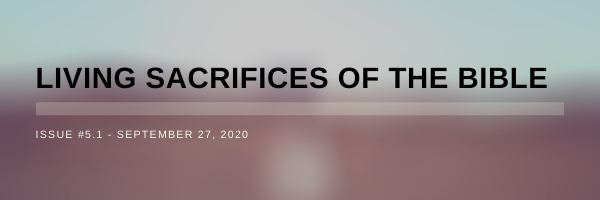
“Ruth: A Living Sacrifice”
[By Taryn Turner]
The story of Ruth, a short book in the Old Testament, is one that not only reveals the mixed lineage of Jesus, but also reveals the attributes of a young Moabite woman. Despite her background, she displayed herself as an example of a living sacrifice (Rom. 12:9-21) when she insisted on staying with her mother-in-law so that she may become one with the Israel nation and their God.
Ruth first demonstrated her fervor in spirit (Rom.12:11) when Naomi insisted she return to her homeland after the death of her two sons, Mahlon and Chilion. One of which Ruth had been married to for ten years. Orpah, Naomi’s other daughter in law, left without a second glance back, while Ruth clung to Naomi (Ruth 1:14). She then confided in Naomi that “your people shall be my people, and your God my God” (Ruth 1:16, ESV). Ruth understood the hardships she would face by staying with her mother-in-law in a land not her own, without the security of a husband. She was able to do so anyway, due to her immense trust in God.
This trust allowed her to leave her family and land behind permanently without the safety a husband would provide. In the ten years that Ruth was married into the Israelite family, she had seen the work of the Lord in their family, and how He blessed and protected the nation. This knowledge fueled her desire to leave everything she thought she knew, and stay in a land where the one true God dwelled. In 1 John 3:16, John wrote that love would be known by sacrifice. Ruth’s sacrifice of her homeland and family was a demonstration of her love for Naomi.
In Matthew 10:34-39, Jesus talked of how he had brought a sword that will divide family members who do not place God first in their hearts. In verse 39 of the passage he stated, “Whoever finds his life will lose it, and whoever loses his life for my sake will find it” (ESV). Also in Matthew 19:29 (ESV), Jesus stated, “Everyone who has left houses or brothers or sisters or fathers or mothers or children or lands, for my name’s sake, will receive a hundred-fold and will inherit eternal life.” Not only would Ruth’s sacrifice allow her to be with the true God, but it would also allow her to inherit the sweetest reward. In addition to Ruth’s fervor of spirit, she was constantly contributing to the needs of others (Rom. 12:13).
Due to the customs of the time period, once Ruth married again, the land that once belonged to her husband would go to that of her new husband. Thus, taking the land away from the family of Elimelech, Naomi’s deceased husband. This would result in the destitution of Naomi who stated that she was too old to be remarried and would have no title or land to her name.
Ruth by withholding from marrying another, attracted the notice of Boaz, Elimelech’s cousin. He told Ruth that her love and sacrifice for Naomi did not go unnoticed and God would surely bless her for taking refuge under the Lord’s wings (Ruth 2:11-13). Naomi saw the interest that Boaz had taken with Ruth, and instructed Ruth to meet Boaz later that night while providing specific instructions on how to do so. So, Ruth willingly went through with Naomi’s instruction, understanding that in doing so she may save Naomi from destitution. Yet again, Boaz is impressed and encouraged by Ruth’s love and sacrifice for her mother-in-law (Ruth 3:10-12) and agreed to be her “redeemer”, a term used to describe a relative who is able to restore the rights of another. In this instance, it is referring to the land that was once Elimelech’s, so that the land of her deceased husband may once again be returned to the family.
Finally, in chapter four upon reading of Ruth giving birth to a son, Naomi rejoiced because “A son has been born to Naomi” (Ruth 4:17, ESV). Despite her attitude of indignation toward God earlier in the narrative (Ruth 1:21). Therefore, Naomi, content with the restoration of Elimelech’s land, and a grandson to provide generations of the family to come, was satisfied with her immediate reward. However, Ruth’s reward is one that is not only substantial, but also everlasting. Her dedication to her mother-in-law and her willingness to leave her home country to follow the one true God are the attributes of a living sacrifice, whose reward would come later (Matt. 19:29). After reading the narrative and observing the contrast between the attributes of these women, one should consider: “Am I Naomi, or Ruth?”
